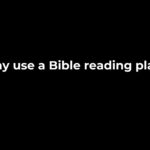On Thursday of last week, I wrote an article called “3 Types of Pastor Mentioned in the Bible”. The article described the wicked pastor, the wayward pastor and the wise pastor. In this second article, I intend to address a very important follow up question: how can the average person protect themselves from wicked and wayward pastors?
Three suggestions come immediately to mind.
1. Read, read, read your Bible
The best way to spot a false shepherd is to know the true Gospel.
Read the Bible.
Cover to cover.
Every year.
If you know the Bible there is no good reason for you to be taken in by false teaching.
I remember as a small boy hearing that RCMP officers spend a great deal of time studying authentic one hundred dollar bills. The best way to spot a counterfeit bill is to become intimately familiar with the real deal. The same holds true for Christians. The best way to protect yourself from falsehood is to become intimately acquainted with the truth.
No one who reads the Bible every year could possibly believe in the Prosperity Gospel. There is just way too much suffering in the Scriptures – way too much Job – way too much Apostle Paul – way too much Jesus on the cross – to believe in that sort of insipid nonsense. You have to be biblically illiterate to believe in something that far from the main thrust of the Gospel plotline. Therefore if you do believe it – or if you believe in some other equally obvious deviation from the truth – that’s on you.
The Apostle Paul said:
God sends them a strong delusion, so that they may believe what is false, in order that all may be condemned who did not believe the truth but had pleasure in unrighteousness. (2 Thessalonians 2:11–12 ESV)
If you prefer a wicked lie to Gospel truth then that’s on you.
False teachers only exist in the church because there are people who want to buy what they are selling. If nobody sat for that kind of nonsense and if nobody paid for that kind of nonsense then pretty soon that kind of nonsense would be out of business.
Read your Bible and insist that your pastor preaches from the Bible. If he doesn’t say some version of “Open your Bible to page so and so” within the first 5 minutes of his sermon, get up and walk out the door.
And don’t go back.
If more people did that then there would be far fewer false shepherds operating in the church.
2. Go to a church that has a strong Board of Elders
Beware of any pastor who wants to rig the polity of the church so that he could never be challenged, thwarted or corrected. If you go to a church where the pastor controls 51% of the leadership pie – run for your life!
In most congregational churches the pastor, or teaching elder, is balanced out by elected or ruling elders. In many polity structures, the salaried teaching pastor can’t do anything and spend any money without first convincing 8-10 other non-salaried leaders that his plan is faithful, feasible and wise.
This is a very reasonable precaution.
If the pastor isn’t truly accountable to a strong board of elders then you shouldn’t feel safe being a member of the church.
A strong board of elders should be able to evict a wicked pastor.
A strong board of elders ought to be able to correct and corral a wayward pastor.
A strong board of elders ought to support and encourage a wise pastor.
If your church doesn’t have a strong board of elders then you are playing Russian Roulette as a member.
3. Go to a church that has a printed, public Statement of Faith
A Statement of Faith is not meant to replace the Bible, a Statement of Faith is intended to summarize what the church has collectively understood the Bible to be saying. It isn’t safe to go to a church that does not have a public statement explaining how they are reading and teaching the Bible.
Ambiguity and opacity are the devil’s foothold.
Every church should clearly and publicly state what they believe about the Scriptures, about God, about human beings, about our redemption in Christ, about the work of the Holy Spirit, about the church, about the ordinances and sacraments, about marriage and human sexuality, about the return of Christ, final judgment and the everlasting fate of the righteous and the wicked. If a church won’t tell you what they believe about such things – run for your life!
A well written public Statement of Faith should function like a set of bumper rails knocking a wayward pastor back towards the centre while keeping a wicked pastor completely out of your lane.
If your church doesn’t have one insist that they write one immediately.
If your church’s Statement of Faith could fit on a bottle of salad dressing insist that they write a better one.
Better in this case means longer, clearer and more comprehensive.
You wouldn’t get into a car that didn’t have brakes or a functioning air bag so why would you not insist on similar safety features in your local church?
Don’t be naïve. The Bible says that there are wicked and wayward pastors out there and ultimately it is up to you to know who’s who. The Apostle John told his people:
If anyone comes to you and does not bring this teaching, do not receive him into your house or give him any greeting, for whoever greets him takes part in his wicked works. (2 John 1:10–11 ESV)
John said that if any preacher or teacher is not operating in accordance with the Apostolic doctrine he is not to be received or supported. He expected people to know what the Apostolic doctrine was and he expected them to withdraw support and hospitality from any pastor who didn’t toe the line.
He didn’t put that responsibility on the denomination.
He didn’t put that responsibility on a bishop.
He didn’t put that responsibility on The Gospel Coalition.
He put it on us.
He put it on the congregation as a whole.
We are supposed to know our Bibles. We are supposed to know what a church is and how it’s different than a business or a fiefdom. We are supposed to know what a shepherd should smell like and we’re supposed to be able to tell when we are being fed a meal of horse apples.
False teachers will always exist – Paul said that God sends them out into the world like flypaper in search of fools – but whether they are received and employed within our congregations is ultimately up to us.
A Role For Fellow Shepherds?
Granted that the ultimate responsibility for rejecting wicked pastors and correcting wayward pastors rests with the local church, the question remains as to whether or not the wider “college of the clergy” has any sort of role to play in the process. In some denominations, a senior minister functions as a “pastor to the pastors” and may consult with congregations on matters of discipline and censure. In the absence of such support mechanisms what role ought neighbour pastors to play in correcting the wayward and isolating the wicked?
Two suggestions immediately come to mind.
1. Know who you’re dealing with
A great deal of harm can be done to people (pastors are people after all!) and churches when neighbour pastors fail to distinguish between “a brother in another Christian tradition”, “a wayward pastor” and “a wicked shepherd”. A man who treats all three of those people the same way ought himself to be removed from the ministry. The job of the Baptist pastor is not to censure and slander the Presbyterian pastor. His job is to do his work and mind his own business and to wait for the judgment of the Lord.
If however a pastor in a particular local church sees a neighbour pastor beginning to drift into sin or to wander from the truth then that pastor should engage his brother in honest and frank conversation. He should pray for him and he should plead with him. He should treat him as a fellow believer and he should be ever mindful of his own sin but he has a responsibility to do what he can to save his friend from making shipwreck of his life and ministry.
If a pastor in a local church becomes convinced that a fellow pastor is an actual, bonafide heretic (he denies a cardinal Christian doctrine such as the Trinity, the divinity of Christ, the incarnation, the bodily resurrection, salvation by grace etc.) then he should confront the brother privately and if he does not recant then the pastor must immediately warn his people to avoid this wicked shepherd and to not receive him or support him in any way. This would include not buying his books, not listening to his podcasts and not supporting his blog or recommending his articles on Social Media.
And then, he should quickly get back to work given that “Wolf Slayer” is not a part of the pastor’s official position description. The Apostle Paul warned his people and he told them to be alert – but he did not spend a great deal of time trying to harass false teachers into retirement. He identified their error and he argued forcefully for the truth – and then he moved on.
And so should we.
Be careful not to become addicted to theological hand-to-hand combat. It can happen. It happens a lot. And it makes you part of the problem rather than part of the solution. So figure out who you’re dealing with, act accordingly, do what you need to do, and then return to your primary duties. If you can’t remember what your primary duties are, see John 21:15-19.
2. Commit to regular accountability
The best thing you can do as a local pastor to combat the spread of wicked and wayward shepherds is to not become one. Towards that end, you need to be in submission to a group of strong, biblically literate men. If there is no one in your church who can come into your office, close the door and rebuke you to your face – run for your life! You are about to become part of the problem.
You need to be corrected.
God will allow you to be wrong from time to time just to make sure that you are aware of your own limitations. Here’s a quick system check: who noticed the last time you made a significant mistake? If the answer is no one, you need to revisit your polity. If you do that and still no one notices, you need to revisit your leadership style. There should be people on your senior leadership team who feel secure and confident enough to tell you when you have made a mistake, crossed a line or failed to show proper love and compassion.
If you don’t have that, you are a wayward pastor in the making.
You should also submit to other forms of accountability outside the polity structure of your church. Join a local ministerial or start a local chapter of The Gospel Coalition. Get a few like-minded men together and commit to mutual accountability.
That’s the best thing you can do to make sure that you never become the wayward pastor of 1 Corinthians 3 or heaven forbid, the wicked pastor of Matthew 24.
Even still, come Lord Jesus!
Pastor Paul Carter
To listen to Pastor Paul’s Into The Word devotional podcast on the TGC Canada website see here. You can also find it on iTunes.
















